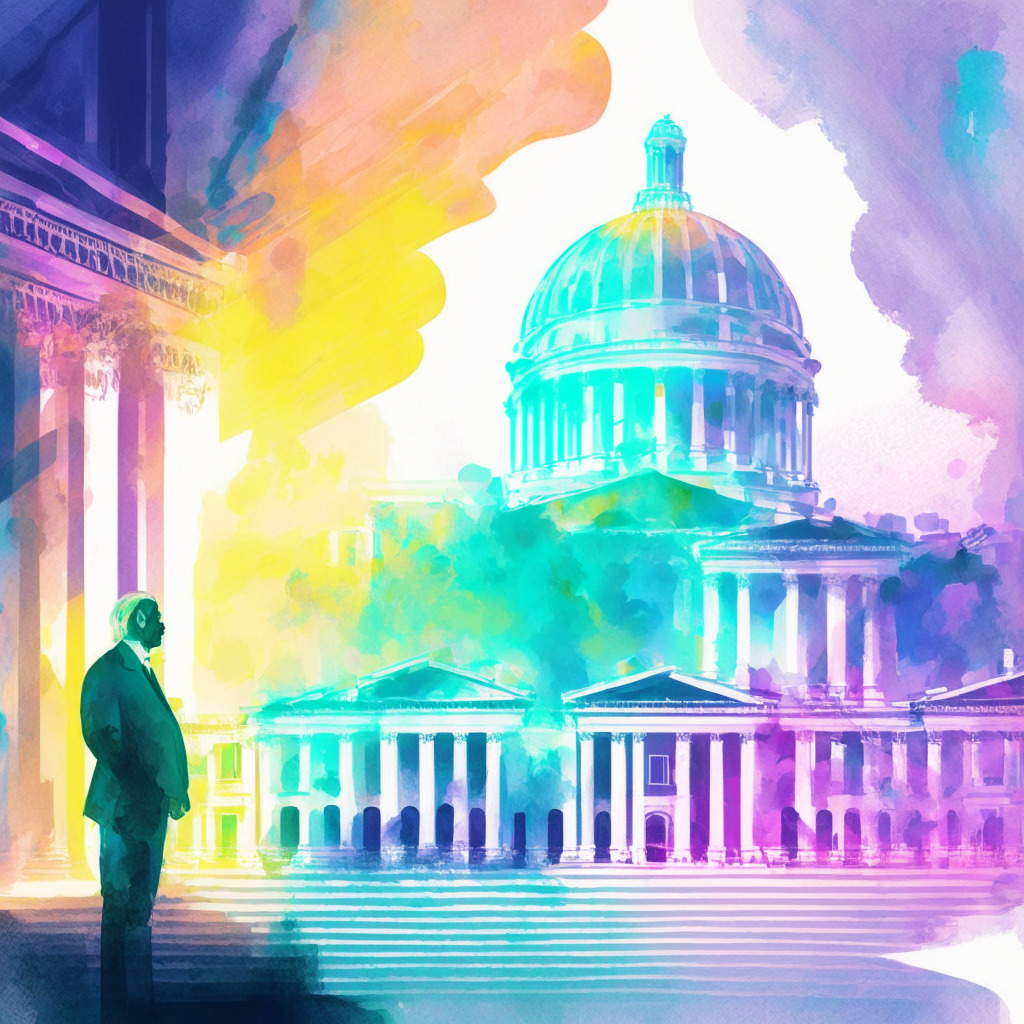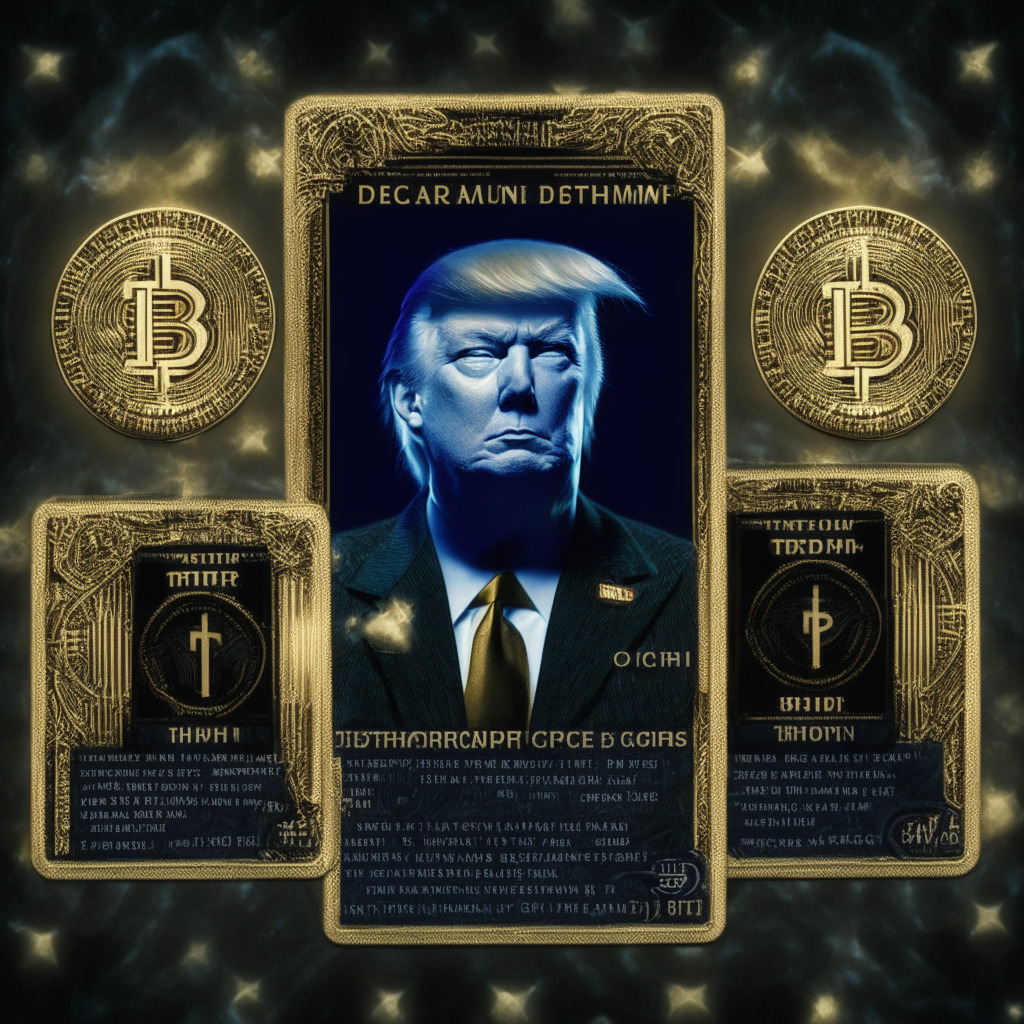The digital asset market recently observed a significant increase, with product inflows reaching $78 million, marking the highest rise since July. A surge was also seen in exchange-traded products, growing 37% in a week. Bitcoin experienced a notable boost, while Ethereum’s growth remains slower. Surprisingly, altcoin Solana recorded substantial outflows, yet maintains popularity. Interestingly, a majority of last week’s inflows originated from Europe due to its clearer regulatory framework.
Search Results for: Digital Asset
Navigating the Digital Asset Frontier: Can Traditional Finance Measures Secure Cryptocurrencies?
“The director of the Consumer Financial Protection Bureau, Rohit Chopra, recently shared that the bureau is contemplating applying the Electronic Fund Transfer Act (EFTA) to digital assets. This approach could minimize high losses often experienced from unauthorized crypto transactions and aim to establish safer environment for investors.”
Hong Kong’s Emergence as Regulated Crypto Haven: Implications for Beijing’s Stance on Digital Assets
“Hong Kong, despite Beijing’s clampdown on digital assets, has emerged as a leader in the regulated cryptocurrency market due to crypto-friendly policies. This shift, characterizing a potential softening stance from Beijing, occurs as transaction volumes in China significantly fall, hinting at a tentative approach towards cryptocurrency.”
Navigating Uncharted Crypto Waters: The Impact of New House Leadership on Digital Asset Regulation
“A staunch crypto advocate, Representative Patrick McHenry, has provisionally stepped into the role of US House Speaker. McHenry has shown appreciation for the significance of American innovation and advocated for stablecoin regulation. These transitions bring opportunities and challenges for digital currencies and their regulation.”
Scaling the Regulatory Walls: Challenges and Solutions for Digital Asset Markets
The World Federation of Exchanges (WFE) proposed six measures to ensure the safety and sustainability of digital asset markets. These include clear segregation of market infrastructure functions and establishing systems to manage user risks. The WFE also emphasized the need for crypto exchanges to demonstrate full backing of user assets and be sufficiently regulated.
Embracing Digital Assets: A Rewarding Yet Daunting Shift for Traditional Financial Institutions
Adding digital assets to traditional portfolios has its unique opportunities and challenges. Navigating the novel landscape of digital assets requires risk management, understanding of blockchain technology, robust cybersecurity protocols, and a focus on legal compliance amidst evolving regulations. Embracing digital assets is a transformative journey redefining conventional financial systems.
Hypothekarbank Lenzburg Navigates The Blockchain Wave: A Swiss Tale of Digital Assets & Risks
“Hypothekarbank Lenzburg, a Swiss bank with over $7 billion assets, has joined the Six Digital Exchange, becoming the sixth Swiss bank to do so. This move enables the bank to trade a variety of digital securities on a blockchain-oriented platform.”
The US Political Unrest: A Roadblock for Crypto-focused Bills and Digital Asset Future
“The threat of a US government shutdown could influence the future of digital assets. Crypto-focused bills like the FIT, Blockchain Regulatory Certainty Act, and Keep Your Coins Act risk being delayed. Any shutdown could stall these bills’ progress until government funding is secured for the next fiscal year.”
Bipartisan Battle for Crypto: A Deep Dive into U.S. Digital Asset Regulation
Senators Kirsten Gillibrand and Cynthia Lummis have introduced a new crypto bill, the Responsible Financial Innovation Act, aimed at addressing regulatory ambiguity in the US cryptocurrency industry. This legislation could shift the oversight of most digital assets from SEC to the Commodity Futures Trading Commission.
Unveiling Busan’s Digital Asset Exchange: Transforming Asset Trading in South Korea
“City officials in Busan, South Korea, plan to launch a digital assets trading platform, leveraging fourth-generation blockchain technology. The platform, called Busan Digital Asset Exchange (BDX), aims to tokenize valuable assets and diversify its covered assets.”
Navigating the Regulatory Tussle: Decentralization vs Security in the Digital Asset Realm
The rapid transformation in technology and finance is due to the expanding incorporation of blockchain technology and digital assets. While this revolution brings significant advantages, it also comes with regulatory complexities. For instance, the recent verdict of the Delaware bankruptcy court granting FTX the right to sell their digital assets highlights control issues contrary to blockchain’s decentralized nature.
Navigating Bankruptcy: How Crypto Exchange FTX Plans to Leverage $3.4 Billion in Digital Assets
Judge John Dorsey has permitted FTX, a bankrupt crypto exchange, to sell and invest its $3.4 billion crypto assets to pay off creditors. FTX’s strategy involves hedging its assets to lower risk and staking digital assets for low risk returns. They also aim to leverage expert knowledge in navigating the volatile crypto market.
Unlocking Insolvency: How a New Remuneration Scheme from DCG could Revolutionize Digital Asset Recovery
Gemini Earn users might recover almost all claims due to a proposal by the Digital Currency Group (DCG). This plan, which may result in a 70-90% recovery for creditors, involves the use of digital assets, but also raises concerns about cryptocurrency market volatility. The proposal’s success crucially depends on approval and renegotiation of a significant loan. Despite potential risks, it signifies a monumental step in tackling insolvency in the digital currency sector.
Heavy Hitters Form Crypto Freedom Alliance in Texas: Pathway to Clearer Digital Asset Regulations
“The newly formed Crypto Freedom Alliance of Texas, comprising key crypto entities, aims to promote clear regulations for digital assets in Texas through education. The initiative emphasizes the challenges of legal jurisdiction for Decentralized Autonomous Organizations (DAOs) and advocates for crypto-friendly tax laws and reshaped banking regulations.”
Fireblocks’ Non-Custodial Wallets: Shaping the Future of Digital Asset Control and Security
Cryptocurrency custody firm Fireblocks, in response to market leaders’ high-profile collapses, introduces a non-custodial wallet service, giving users control over their cryptographic keys. Adopting a fully non-custodial setup empowers users, bypasses regulatory restrictions and potentially revolutionizes fintech and blockchain technology’s future.
Balancing Cryptocurrency Taxation: Equity and Evasion in the Digital Asset Space
The Blockchain Association, a U.S-based crypto advocacy group, submitted legislation proposals for equal taxation of crypto and non-crypto assets. The recommendations support the Keep Innovation in America Act, which aims to revise reporting standards for cryptocurrency transactions. Concerns arise around potential tax evasion and proposed digital asset mining excise tax.
Impending Shift in Crypto Asset Reporting: A Boon for MicroStrategy and Future of Digital Assets
MicroStrategy is expected to report its bitcoin holdings without disclosing impairment losses, thanks to a new amendment by the Financial Accounting Standards Board (FASB). This could potentially erase MicroStrategy’s cumulative impairment losses of $2.23 billion since the start of its bitcoin strategy in 2020.
Exploring OpenSea: Transforming Digital Asset Ownership Through NFTs and Facing Challenges
OpenSea, a decentralized marketplace for nonfungible tokens (NFTs), is revolutionizing the digital ownership economy. However, its reliance on cryptocurrency and possible exposure to fraudulent NFT listings are potential drawbacks. Despite these limitations, OpenSea continues to transform our interaction with digital assets.
Japan’s FSA Suggests Crypto Tax Reforms: An Effort to Revitalize the Digital Asset Landscape
Japan’s top financial regulator, the Financial Services Agency (FSA), has proposed changes to the country’s tax laws regarding digital asset profits. This move aims to better align Japan’s stance on cryptocurrencies with global standards, reduce financial burdens on local businesses, and foster innovation within the blockchain industry.
KEB Hana Bank Seizes Future of Blockchain with BitGo Partnership: A Dive into South Korea’s Digital Asset Market
South Korea’s KEB Hana Bank partners with BitGo, a leader in crypto custody and security, to offer digital asset custody services from 2024. The partnership is expected to enhance consumer protection and trust in South Korea’s digital asset market and improve the quality of Hana Bank’s digital asset custody operations. The collaboration also aims to capitalize on blockchain security technology, backed by BitGo’s recent funding of $100 million.
Diversifying Crypto Investments: HashKey Capital’s Novel Strategy and the Implications for Digital Assets
Hong Kong’s HashKey Group, through HashKey Capital, is taking an interesting approach with its new fund, planning to allocate less than half of its portfolio to Bitcoin and Ethereum. The strategy seems to suggest an increased focus on alternative cryptocurrencies, driven by the weaker performance of the Hong Kong stock market and the rising demand for above-market returns in cryptocurrency.
Unraveling the IRS Draft on Digital Asset Reporting: A Regulatory Leap or Misguided Move?
The US IRS has issued draft guidelines on reporting rules for digital asset brokers. Aimed at regulating the digital asset industry, this regulation intends to streamline tax reporting and prevent fraud, proposing to raise $28 billion in fresh tax over a decade. Critics label it as “misguided” and “an attack on the digital asset ecosystem.”
Digital Assets vs. Taxation: Balancing Act of Decentralization and Financial Fairness
“The South Korean city of Cheongju is planning to confiscate digital currencies from local tax evaders. Governments worldwide are concerned about the misuse of digital currencies for tax evasion. However, applying standard tax structures to decentralized currencies has received criticism from crypto enthusiasts.”
Emergence of Tech Adaptability: Digital Asset Miners Venturing into AI Services
“Digital asset miners are venturing into artificial intelligence, aiming to boost earnings and decrease dependency on conventional cryptocurrency operations. Notably, Bitcoin and Ethereum miners are driving this switch, while some miners continue mining other Proof-of-Work assets. Mining companies are rebranding to echo this trend, finding high-performance computing services for AI firms potentially more profitable than Bitcoin mining.”
Secret Cryptography: Trump’s Hidden Digital Assets Stir Presidential Crypto Debates
Former US President Donald Trump reportedly holds $2.8 million in a digital wallet, a larger sum than previously disclosed. Trump’s venture into the crypto domain began with his NFT endeavor, Trump Digital Collectible Cards. The discovery shows his deepened involvement in cryptocurrency. Meanwhile, other presidential candidates voice their crypto policies, underlining the rising influence of cryptocurrencies on the political stage.
Digital Energy Council: Sustaining Crypto Mining and Shaping Policymaking in Digital Assets
The Digital Energy Council, a group dedicated to cryptocurrency miners, has been introduced as a crucial intermediary for discussions about crypto mining sustainability, and policy advancement with Washington-based policymakers. This initiative prioritizes miners’ interests while ensuring compliance with U.S. energy laws, aiming to promote responsible energy development and national security.
Unleashing the Crypto Future: An Analysis of the FIT Act and its Impact on the Digital Asset Space
“The FIT Act marks the premiere of crypto-focused legislative efforts gaining traction in U.S. Congress. This signals mutual agreement about the significance of the digital assets sector, addressing the inadequacy of the current regulatory system, and fostering innovation. Policymakers are establishing a suitable framework for the rapidly evolving crypto industry.”
Former President’s Hidden Crypto Treasures: Legitimacy or Distraction for Digital Assets?
“Former U.S. President, Donald Trump, may own up to $500,000 in Ethereum according to a recent report from the U.S. Office of Government Ethics. Despite his skepticism towards cryptocurrencies, Trump has effectively capitalized on the NFT trend with his own collection of NFT cards.”
PayPal’s Cryptocurrency Hub: A Revolution or a Stir in Digital Asset Management?
“PayPal is introducing a Cryptocurrencies Hub, allowing users to buy, sell and pay with digital assets like Bitcoin. However, not all users will have access and while the hub represents ownership, it won’t confer actual possession of the digital assets.”
The Crushing Uncertainty: Crypto’s Struggle with Regulators and the Future of Digital Assets
“A significant episode in China underlined the persistent uncertainty around cryptocurrency’s legal status. A man lending Bitcoin faced an unsympathetic legal system when the borrower defaulted. The court ruled Bitcoin, as a digital commodity, doesn’t hold the same legal status as fiat currencies, therefore, can’t be subject to legal enforcement or compensation.”
Hong Kong’s Crypto Licensing Regime: A Barrier or Opportunity for Digital Asset Market Players?
Hong Kong’s new virtual asset trading platform licensing regime could cost crypto platforms up to $20 million, potentially pushing smaller market players out of the race. However, it may benefit larger players like Hex Trust, which meet the required criteria. The regime is part of Hong Kong’s effort to become a digital asset hub, inviting global exchanges to apply for licenses. Critics, though, suggest the system’s complex requirements may be challenging.
Navigating the Stormy Seas of Digital Assets: Promising Advances and Regulatory Pitfalls
“The digital assets landscape is dynamic, but not insulated from regulatory scrutiny. Despite substantial backing, some ventures like Nifty’s struggle, while partnerships like Tel Aviv Stock Exchange and Fireblocks demonstrate promising blockchain confidence. However, the translation of tech potential to market reality presents challenges.”































